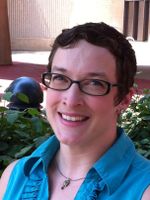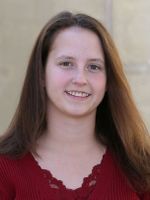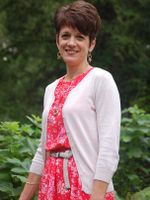WVU CPASS staff share personal experiences from their involvement with the
program
Myia Welsh

This position had a significant impact on my professional development. I was
no stranger to project management, but this project helped me grow those skills
to suit a state-wide scale with multiple levels of stakeholders. In the six
years I held this position, my project management skills and my managerial skills
developed tremendously. I was well-supported by CPASS, Dr. Zizzi and WVU Talent
and Culture while I grew as a leader.
I have really loved the view of West Virginia that working with folks across
the state can give you. West Virginia is a unique place and I saw that again and
again in my work with participants and facilities. I have enjoyed learning
about the ways that small rural communities function. Everyone wears multiple hats
to meet community needs. Some of the communities the program operated in were
small.
So, a participant who is a public employee may also lead the community's search and
rescue canine training. Or the city official who manages a community center who
participates in our program may also be a 911 operator and lead the community’s
youth basketball league. The personal trainer may also be the elementary school
principal. I have never experienced that any place else I've lived. There
is a sense of ownership and pride that comes through when you work with small West
Virginia communities that I have felt truly privileged to experience.
I've learned a lot about what's possible from the people in these communities.
The fitness partners’ contribution was significant. The program simply can't run
without the dietitians and fitness professionals. The registered dieticians (RDs)
provided one on one Medical Nutrition Therapy. Most people don't get access to
that level of individualized expertise unless it is specially ordered by your
physician. From the start, we were getting people access to that service and setting
the expectation that food is important to health. The RDs that work with the program
are incredibly skilled, and they must navigate some tough conversations to be effective.
If you think about it, when you're talking to someone about what they eat, you're
actually talking to them about a whole host of sensitive things: family culture,
family traditions, peer environments, how they spend their leisure time and how
they sooth themselves. The RDs talk to people about food, but they are also talking
to them about the culture and practices that make up a life.
Our fitness partners also make a huge contribution. They are the face of the program.
Fitness staff personally meet with people every month. They are right there with
the participant every step of the way. They witness each struggle and achievement.
The program was built to foster a relationship with fitness professionals in a
participant's community, helping participants access those professionals years
from now.
We've seen participants create great relationships with the fitness professionals
at their facilities and then long after they are done with the program, they can
call on those professionals for additional help. For instance, a participant may have
taken up jogging while in the program and years later may work with their
local fitness professionals on training for their first half marathon. The fitness
professionals give participants a resource to lean on for years to come.
Kaitlyn Shaffer

I gained an admiration and appreciation of the work that West Virginia’s public employees
perform. They shared their successes, failures, and struggles. Working
with the Weight Management Program (WMP) influenced my decision to return to school
to obtain a Master’s degree in Public Administration. Although I am no longer
working with PEIA on this project, I will continue to be an advocate for WV’s public
employees and those working in public administration fields.
I also developed an interest in project/program management that I hope to continue
expanding upon in other career opportunities. In addition, the opportunity
work closely with many diverse CPASS Sport and Exercise Psychology graduate students
has been really rewarding. It has helped me gain an appreciation for the work that
PhD level students perform and the vast amount of knowledge and experience that
they contribute.
I’ve enjoyed helping PEIA insured members navigate their health insurance to tap
into this wonderful benefit. I’ve enjoyed hearing participants’ success stories
and have learned that success is much more than large reductions in weight on the
scale.
Success can be transitioning from Velcro shoes to shoes that tie, being able to independently
fasten the seatbelt or go grocery shopping, taking the stairs without becoming
winded, being able to get on the floor to play with your children or grandchildren,
being able to walk in and confidently use the fitness center when it was previously
too intimidating to even get out of the car, avoiding invasive medical procedures
like joint replacements or bariatric surgery and/or being able to stop taking prescription
medications that one had been taking for years.
I’ve enjoyed helping our community partners navigate the insurance side of the WMP
benefit and have enjoyed helping them work with people who may be somewhat different
from their regular clientele. I’ve developed connections with dietary and fitness
professionals whom I probably would not have developed had I not had the opportunity
to work with this program.
Dietitians and fitness professionals have used their expertise to shape program curriculum.
In addition, their work is what makes the program, and, in my opinion, there wouldn’t
be a WMP benefit without their efforts. They are the ones meeting with, connecting
and educating PEIA members toward making healthy, sustainable lifestyle change. Their
knowledge and expertise has helped many PEIA insured members meet their dietary
and fitness goals. Their continued willingness to partner with PEIA and the
WMP affiliated fitness centers have been crucial to sustaining the WMP for many
years.
Catherine Shaw

Working with the PEIA Weight Management Program has broadened my areas of expertise
in medical nutrition therapy and allowed me to change the focus of my career. Instead
of working with patients who are so ill that they are hospitalized or institutionalized,
I could help people improve their health in hopes of avoiding chronic or catastrophic
illness. It was a way to bring the joy of healthy eating and lifestyles to the
people we serve.
Working with participants both face-to-face in facilities, and in my current position
has helped develop my counseling skills and become a better RD. It also helped
me create a network of professionals around the state with a common mission-to
improve the health of West Virginians through food and nutrition. It was also
a way to increase our reach as dietitians, being able to help more people
in more places in our communities.
What I enjoyed most about working with participants was the relationships that were
created, and the excitement that was shared when they were successful, no matter
how small or large that success may have been. Our community partners were fantastic.
I felt like we were a team working with people to improve their lives.
Most participants told me daily how our program and the professionals they interacted
with (RDs, behavior counselors, and fitness professionals) have helped them. I
always heard, "I feel so much better. I didn't know I could feel like this." That
takes team work, and even in a large state-wide program like ours, our teams worked
together to achieve a common goal for our participants.
The biggest contribution we have all made, is that we have changed lives for the
better. We have helped people discover the joy of healthy eating and of physical
activity in their lives. RDs have helped people address their medical conditions
through nutrition counseling that may not have otherwise been made available to
them. We have helped people make practical changes to what and how they eat in
their daily lives to help manage their weight and improve their health. Fitness
professionals have helped people enjoy being active again, or start being active
if they never have been. Most people who leave the program decide to stay on as
a member at their gym. Something is sinking in.
This program has been a joy to work with. We have touched thousands of lives and
have had a significant impact on those we have served.